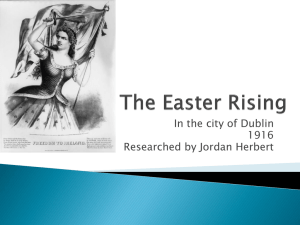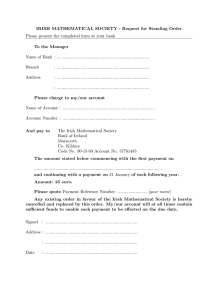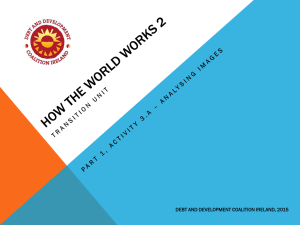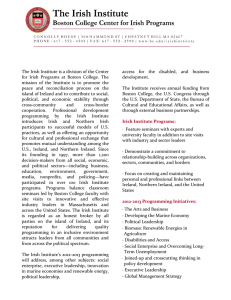Dr. Fearghal McGarry is Reader in history at Queen’s University... focuses on modern Irish history and his most recent book...
advertisement
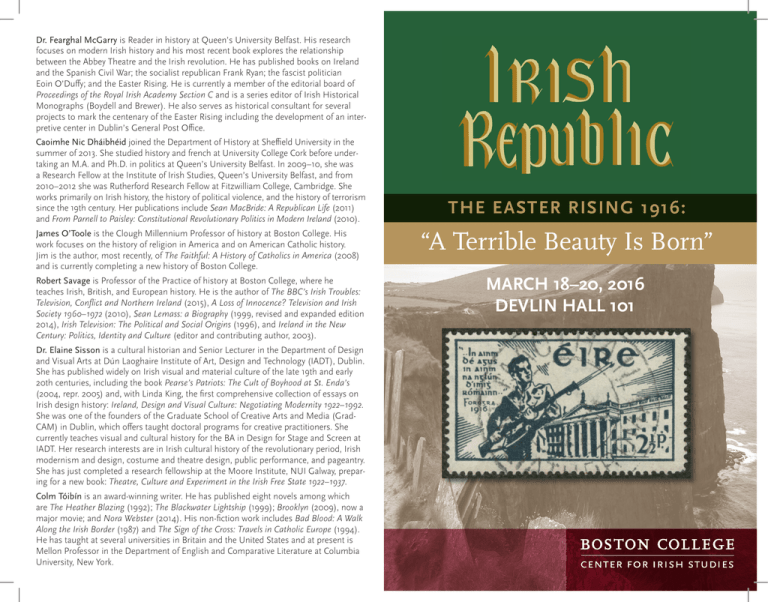
Dr. Fearghal McGarry is Reader in history at Queen’s University Belfast. His research focuses on modern Irish history and his most recent book explores the relationship between the Abbey Theatre and the Irish revolution. He has published books on Ireland and the Spanish Civil War; the socialist republican Frank Ryan; the fascist politician Eoin O’Duffy; and the Easter Rising. He is currently a member of the editorial board of Proceedings of the Royal Irish Academy Section C and is a series editor of Irish Historical Monographs (Boydell and Brewer). He also serves as historical consultant for several projects to mark the centenary of the Easter Rising including the development of an interpretive center in Dublin’s General Post Office. Caoimhe Nic Dháibhéid joined the Department of History at Sheffield University in the summer of 2013. She studied history and french at University College Cork before undertaking an M.A. and Ph.D. in politics at Queen’s University Belfast. In 2009–10, she was a Research Fellow at the Institute of Irish Studies, Queen’s University Belfast, and from 2010–2012 she was Rutherford Research Fellow at Fitzwilliam College, Cambridge. She works primarily on Irish history, the history of political violence, and the history of terrorism since the 19th century. Her publications include Sean MacBride: A Republican Life (2011) and From Parnell to Paisley: Constitutional Revolutionary Politics in Modern Ireland (2010). THE EASTER RISING 1916: James O’Toole is the Clough Millennium Professor of history at Boston College. His work focuses on the history of religion in America and on American Catholic history. Jim is the author, most recently, of The Faithful: A History of Catholics in America (2008) and is currently completing a new history of Boston College. “A Terrible Beauty Is Born” Robert Savage is Professor of the Practice of history at Boston College, where he teaches Irish, British, and European history. He is the author of The BBC’s Irish Troubles: Television, Conflict and Northern Ireland (2015), A Loss of Innocence? Television and Irish Society 1960–1972 (2010), Sean Lemass: a Biography (1999, revised and expanded edition 2014), Irish Television: The Political and Social Origins (1996), and Ireland in the New Century: Politics, Identity and Culture (editor and contributing author, 2003). MARCH 18–20, 2016 DEVLIN HALL 101 Dr. Elaine Sisson is a cultural historian and Senior Lecturer in the Department of Design and Visual Arts at Dún Laoghaire Institute of Art, Design and Technology (IADT), Dublin. She has published widely on Irish visual and material culture of the late 19th and early 20th centuries, including the book Pearse’s Patriots: The Cult of Boyhood at St. Enda’s (2004, repr. 2005) and, with Linda King, the first comprehensive collection of essays on Irish design history: Ireland, Design and Visual Culture: Negotiating Modernity 1922–1992. She was one of the founders of the Graduate School of Creative Arts and Media (GradCAM) in Dublin, which offers taught doctoral programs for creative practitioners. She currently teaches visual and cultural history for the BA in Design for Stage and Screen at IADT. Her research interests are in Irish cultural history of the revolutionary period, Irish modernism and design, costume and theatre design, public performance, and pageantry. She has just completed a research fellowship at the Moore Institute, NUI Galway, preparing for a new book: Theatre, Culture and Experiment in the Irish Free State 1922–1937. Colm Tóibín is an award-winning writer. He has published eight novels among which are The Heather Blazing (1992); The Blackwater Lightship (1999); Brooklyn (2009), now a major movie; and Nora Webster (2014). His non-fiction work includes Bad Blood: A Walk Along the Irish Border (1987) and The Sign of the Cross: Travels in Catholic Europe (1994). He has taught at several universities in Britain and the United States and at present is Mellon Professor in the Department of English and Comparative Literature at Columbia University, New York. THE EASTER RISING 1916: “A Terrible Beauty Is Born” Friday evening, March 18 6:00 – 6:20 Introduction 6:20 – 7:15 Diarmaid Ferriter “1916: New Perspectives, Old Rows” Colm Tóibín “James Joyce and 1916” 7:15 – 8:00 Reception Saturday, March 19 9:00 – 9:55 Alvin Jackson 10:00 – 10:55 Emily Bloom 10:55 – 11:25 “Irish Unionists and the 1916 Rising” “Broadcasting 1916: Denis Johnston & the BBC” Coffee 11:25 – 12:20 Robert Savage “Lemass, Legacy and the Irish Revolution” 12:20 – 1:40 Lunch (Faculty Dining Room, McElroy Hall) 1:40 – 2:35 Jim O’Toole “Not Hanging But Shooting: The Irish in Boston & the Easter Rising” 2:40 – 3:35 Roisín Higgins “Curators of Memory: Women & the Easter Rising” 3:35 – 4:15 Sheila Gallagher “Teaching 1916, an Interdisciplinary Approach” Richard Kearney Robert Savage 4:15 – 4:30 Coffee 4:30 – 5:30 Gallery tour 5:30 – 6:30 Reception (sponsored by the Consuls General of Ireland & the U.K.) “The Arts & Crafts Movement: Making It Irish” Sunday, March 20 9:30 – 10:25 Fearghal McGarry “How to Stage a Revolution: The Abbey Theatre’s 1916 rebels” 10:25 – 10:55 Coffee 11:00 – 11:55 Caoimhe Nic Dháibhéid “An Intimate History of 1916: Grief & Loss in the Republican Aristocracy” 12:00 – 12:55 Elaine Sisson “Pearse, Cúchalainn and 1916” 1:00 (Faculty Dining Room, McElroy Hall) Lunch Speaker profiles Emily Bloom is a Visiting Assistant Professor at Columbia University specializing in modern British and Irish literature. Previously she has served as Assistant Professor at Georgia State University and Visiting Professor at the United States Air Force Academy. She has published articles on the radio broadcasts of W. B. Yeats, performance traditions in the works of James Joyce and Samuel Beckett, and Irish radio drama of the 1950s. Her book, The Wireless Past: Anglo-Irish Writers and the BBC, 1931–1968, forthcoming from Oxford University Press, connects modernist aesthetics with the rise of radio broadcasting. Diarmaid Ferriter is one of Ireland’s best-known historians and is Professor of Modern Irish History at UCD. His books include The Transformation of Ireland 1900–2000 (2004), Judging Dev: A Reassessment of the Life and Legacy of Eamon de Valera (2007), Occasions of Sin: Sex and Society in Modern Ireland (2009), and Ambiguous Republic: Ireland in the 1970s (2012). His most recent book is A Nation and Not a Rabble: The Irish Revolution 1913–23 (2015). He is a regular broadcaster on television and radio and a weekly columnist with the Irish Times. Sheila Gallagher is an Associate Professor in the Fine Arts Department at Boston College where she teaches contemporary art practice. She is an interdisciplinary artist and curator whose work explores perception, belief, and different modes of representation. Sheila has had numerous solo exhibitions, and has exhibited widely in galleries, museums, and universities in the US. She is the co-author of First-Hand and co-curator of the Becker Collection, a private archive of Civil War drawings that is currently touring the United States (2012–2016). Together with Richard Kearney, she directs the Guestbook Project, an international peace-building initiative that brings together youths from divided communities to exchange stories. Roisín Higgins is a Senior Lecturer in History at Teesside University. She is the author of Transforming 1916: Meaning, Memory and the Fiftieth Anniversary of the Easter Rising (Cork, 2012), which won the ACIS James Donnelly Sr. Prize for History and Social Science. She is the co-editor, with Regina Uí Chollatáin, of The Life and After-Life of P. H. Pearse (Dublin, 2009). Roisín has also been historical advisor on the Commemoration zone of the GPO permanent exhibition in Dublin. She is the project leader on a Heritage Lotteryfunded project, “Dear Mrs. Pennyman,” which is carrying out research into letters sent to Mary Pennyman from widows and mothers of men from Britain and Ireland who died in action during the First World War. Alvin Jackson is Sir Richard Lodge Professor of History at the University of Edinburgh and a former Burns Visiting Scholar at Boston College. He has written extensively on a broad range of modern Irish historical themes. His latest works are The Two Unions: Ireland, Scotland and the Survival of the United Kingdom, 1707–2007 (OUP: 2012) and his edited Oxford Handbook to Modern Irish History (OUP: 2014). He was recently awarded a Leverhulme Trust Major Research Fellowship to support his comparative research into constitutional unions in the 19th and early 20th centuries. Richard Kearney holds the Charles B. Seelig Chair of Philosophy at Boston College and has served as a Visiting Professor at University College Dublin, the University of Paris (Sorbonne), the Australian Catholic University, and the University of Nice. He also currently holds the Chair of the Institute for Critical Philosophy at The Global Center for Advanced Studies (GCAS). He is the author of over 20 books on European philosophy and literature (including two novels and a volume of poetry) and has edited or co-edited 14 more. THE EASTER RISING 1916: “A Terrible Beauty Is Born” Friday evening, March 18 6:00 – 6:20 Introduction 6:20 – 7:15 Diarmaid Ferriter “1916: New Perspectives, Old Rows” Colm Tóibín “James Joyce and 1916” 7:15 – 8:00 Reception Saturday, March 19 9:00 – 9:55 Alvin Jackson 10:00 – 10:55 Emily Bloom 10:55 – 11:25 “Irish Unionists and the 1916 Rising” “Broadcasting 1916: Denis Johnston & the BBC” Coffee 11:25 – 12:20 Robert Savage “Lemass, Legacy and the Irish Revolution” 12:20 – 1:40 Lunch (Faculty Dining Room, McElroy Hall) 1:40 – 2:35 Jim O’Toole “Not Hanging But Shooting: The Irish in Boston & the Easter Rising” 2:40 – 3:35 Roisín Higgins “Curators of Memory: Women & the Easter Rising” 3:35 – 4:15 Sheila Gallagher “Teaching 1916, an Interdisciplinary Approach” Richard Kearney Robert Savage 4:15 – 4:30 Coffee 4:30 – 5:30 Gallery tour 5:30 – 6:30 Reception (sponsored by the Consuls General of Ireland & the U.K.) “The Arts & Crafts Movement: Making It Irish” Sunday, March 20 9:30 – 10:25 Fearghal McGarry “How to Stage a Revolution: The Abbey Theatre’s 1916 rebels” 10:25 – 10:55 Coffee 11:00 – 11:55 Caoimhe Nic Dháibhéid “An Intimate History of 1916: Grief & Loss in the Republican Aristocracy” 12:00 – 12:55 Elaine Sisson “Pearse, Cúchalainn and 1916” 1:00 (Faculty Dining Room, McElroy Hall) Lunch Speaker profiles Emily Bloom is a Visiting Assistant Professor at Columbia University specializing in modern British and Irish literature. Previously she has served as Assistant Professor at Georgia State University and Visiting Professor at the United States Air Force Academy. She has published articles on the radio broadcasts of W. B. Yeats, performance traditions in the works of James Joyce and Samuel Beckett, and Irish radio drama of the 1950s. Her book, The Wireless Past: Anglo-Irish Writers and the BBC, 1931–1968, forthcoming from Oxford University Press, connects modernist aesthetics with the rise of radio broadcasting. Diarmaid Ferriter is one of Ireland’s best-known historians and is Professor of Modern Irish History at UCD. His books include The Transformation of Ireland 1900–2000 (2004), Judging Dev: A Reassessment of the Life and Legacy of Eamon de Valera (2007), Occasions of Sin: Sex and Society in Modern Ireland (2009), and Ambiguous Republic: Ireland in the 1970s (2012). His most recent book is A Nation and Not a Rabble: The Irish Revolution 1913–23 (2015). He is a regular broadcaster on television and radio and a weekly columnist with the Irish Times. Sheila Gallagher is an Associate Professor in the Fine Arts Department at Boston College where she teaches contemporary art practice. She is an interdisciplinary artist and curator whose work explores perception, belief, and different modes of representation. Sheila has had numerous solo exhibitions, and has exhibited widely in galleries, museums, and universities in the US. She is the co-author of First-Hand and co-curator of the Becker Collection, a private archive of Civil War drawings that is currently touring the United States (2012–2016). Together with Richard Kearney, she directs the Guestbook Project, an international peace-building initiative that brings together youths from divided communities to exchange stories. Roisín Higgins is a Senior Lecturer in History at Teesside University. She is the author of Transforming 1916: Meaning, Memory and the Fiftieth Anniversary of the Easter Rising (Cork, 2012), which won the ACIS James Donnelly Sr. Prize for History and Social Science. She is the co-editor, with Regina Uí Chollatáin, of The Life and After-Life of P. H. Pearse (Dublin, 2009). Roisín has also been historical advisor on the Commemoration zone of the GPO permanent exhibition in Dublin. She is the project leader on a Heritage Lotteryfunded project, “Dear Mrs. Pennyman,” which is carrying out research into letters sent to Mary Pennyman from widows and mothers of men from Britain and Ireland who died in action during the First World War. Alvin Jackson is Sir Richard Lodge Professor of History at the University of Edinburgh and a former Burns Visiting Scholar at Boston College. He has written extensively on a broad range of modern Irish historical themes. His latest works are The Two Unions: Ireland, Scotland and the Survival of the United Kingdom, 1707–2007 (OUP: 2012) and his edited Oxford Handbook to Modern Irish History (OUP: 2014). He was recently awarded a Leverhulme Trust Major Research Fellowship to support his comparative research into constitutional unions in the 19th and early 20th centuries. Richard Kearney holds the Charles B. Seelig Chair of Philosophy at Boston College and has served as a Visiting Professor at University College Dublin, the University of Paris (Sorbonne), the Australian Catholic University, and the University of Nice. He also currently holds the Chair of the Institute for Critical Philosophy at The Global Center for Advanced Studies (GCAS). He is the author of over 20 books on European philosophy and literature (including two novels and a volume of poetry) and has edited or co-edited 14 more. Dr. Fearghal McGarry is Reader in history at Queen’s University Belfast. His research focuses on modern Irish history and his most recent book explores the relationship between the Abbey Theatre and the Irish revolution. He has published books on Ireland and the Spanish Civil War; the socialist republican Frank Ryan; the fascist politician Eoin O’Duffy; and the Easter Rising. He is currently a member of the editorial board of Proceedings of the Royal Irish Academy Section C and is a series editor of Irish Historical Monographs (Boydell and Brewer). He also serves as historical consultant for several projects to mark the centenary of the Easter Rising including the development of an interpretive center in Dublin’s General Post Office. Caoimhe Nic Dháibhéid joined the Department of History at Sheffield University in the summer of 2013. She studied history and french at University College Cork before undertaking an M.A. and Ph.D. in politics at Queen’s University Belfast. In 2009–10, she was a Research Fellow at the Institute of Irish Studies, Queen’s University Belfast, and from 2010–2012 she was Rutherford Research Fellow at Fitzwilliam College, Cambridge. She works primarily on Irish history, the history of political violence, and the history of terrorism since the 19th century. Her publications include Sean MacBride: A Republican Life (2011) and From Parnell to Paisley: Constitutional Revolutionary Politics in Modern Ireland (2010). THE EASTER RISING 1916: James O’Toole is the Clough Millennium Professor of history at Boston College. His work focuses on the history of religion in America and on American Catholic history. Jim is the author, most recently, of The Faithful: A History of Catholics in America (2008) and is currently completing a new history of Boston College. “A Terrible Beauty Is Born” Robert Savage is Professor of the Practice of history at Boston College, where he teaches Irish, British, and European history. He is the author of The BBC’s Irish Troubles: Television, Conflict and Northern Ireland (2015), A Loss of Innocence? Television and Irish Society 1960–1972 (2010), Sean Lemass: a Biography (1999, revised and expanded edition 2014), Irish Television: The Political and Social Origins (1996), and Ireland in the New Century: Politics, Identity and Culture (editor and contributing author, 2003). MARCH 18–20, 2016 DEVLIN HALL 101 Dr. Elaine Sisson is a cultural historian and Senior Lecturer in the Department of Design and Visual Arts at Dún Laoghaire Institute of Art, Design and Technology (IADT), Dublin. She has published widely on Irish visual and material culture of the late 19th and early 20th centuries, including the book Pearse’s Patriots: The Cult of Boyhood at St. Enda’s (2004, repr. 2005) and, with Linda King, the first comprehensive collection of essays on Irish design history: Ireland, Design and Visual Culture: Negotiating Modernity 1922–1992. She was one of the founders of the Graduate School of Creative Arts and Media (GradCAM) in Dublin, which offers taught doctoral programs for creative practitioners. She currently teaches visual and cultural history for the BA in Design for Stage and Screen at IADT. Her research interests are in Irish cultural history of the revolutionary period, Irish modernism and design, costume and theatre design, public performance, and pageantry. She has just completed a research fellowship at the Moore Institute, NUI Galway, preparing for a new book: Theatre, Culture and Experiment in the Irish Free State 1922–1937. Colm Tóibín is an award-winning writer. He has published eight novels among which are The Heather Blazing (1992); The Blackwater Lightship (1999); Brooklyn (2009), now a major movie; and Nora Webster (2014). His non-fiction work includes Bad Blood: A Walk Along the Irish Border (1987) and The Sign of the Cross: Travels in Catholic Europe (1994). He has taught at several universities in Britain and the United States and at present is Mellon Professor in the Department of English and Comparative Literature at Columbia University, New York.

